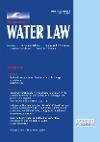Journal of Water Law - Volume 27 - Issue 5

EDITORIAL
Reflections on a new chapter in English sewage regulation
BEN PONTIN
Professor of Environmental Law,
Cardiff Law School, University of Cardiff
ARTICLES
Tackling transboundary groundwater pollution in the Danube River Basin: an evaluation of the legal and governance regimes
ALEXANDER VINOGRADOV-WOUTERS
University of Strathclyde Law School (LLB 2021)
Groundwater is a precious freshwater resource that is essential for a myriad of socio-economic activities and underpins a broad range of diverse ecosystem services. The law relating to the use and protection of transboundary groundwater is complex. It is a resource that is more difficult to identify and monitor than trans-boundary surface waters, which makes the governance of the relevant bodies particularly taxing. The Danube River Basin (DRB), as the world’s most international watercourse, represents a compelling case study in this regard. The matrix of legal frame-works that apply to the Danube comprises a multi-level matrix of transboundary water governance regimes. In order to analyse the regulatory frameworks that apply to the Danube, this article uses a five-point legal analytical framework to distil the relevant rules that apply to transboundary groundwater pollution. This study demonstrates that the legal regime that governs the Danube, including the EU regional framework, is not perfect. Nonetheless, the institutional mechanisms governing the DRB appear to be quite effective, with a remarkable regional model of transboundary groundwater governance that merits closer scrutiny.
Critique of the right of access to water in South Africa: General Comment No 15, 2002 of the Committee on Economic, Social and Cultural Rights as benchmark
NSIKAN-ABASI ODONG
Doctoral candidate, Faculty of Law,
University of Ottawa, Canada
South Africa is one of the first countries in the world to explicitly constitutionalise the right of access to water. The increasing focus on the constitutional right to water is justified because water is both a finite resource and an enabler to the fulfilment of other rights. In view of the strategic role that water plays and the present limited access to water in South Africa, this article examines the challenges to the realisation of the right of access to water. In evaluating this right in South Africa, the article will benchmark this right against the provisions of the General Comment No 15, 2002 of the Committee on Economic, Social and Cultural Rights. The article seeks to make recommendations to further the realisation of the right of access to water for all in South Africa.
State authority rights in Indonesian water law: privatisation and the right to water
LINDA SUDIONO
Lecturer and researcher, Faculty of Law, Universitas Atma Jaya Yogyakarta, Indonesia; doctoral student, Faculty of Law,
Justus-Liebig-Universität Giessen, Germany
The state authority rights concept relating to water resources in Indonesia means that the state reserves the right to control water resources, including the authority to regulate, authorise, and/or issue licences for water sources management. This concept opens a potential gap in state’s authority to issue a licence of water control to private enterprises for the purpose of water com- modification. This article offers a new understanding of how the policy of free market economy and the openness to foreign investment affect the execution of state authority rights in managing water resources. It also highlights the importance of exploring the involvement of financial institutions to understand its crucial impact on the adjustment of water regulation in a developing country, by using Indonesia as the case study. The result shows that there is a relationship between the involvement of inter-national financial institutions and a water privatisation policy that impacts the fulfilment of the citizens’ rights to water in a developing country. The solution offered is a re municipalisation policy which means returning water supply services and sanitation to the local authority under public control.
STRATEGIC ISSUES
England and Wales
Ofwat news
